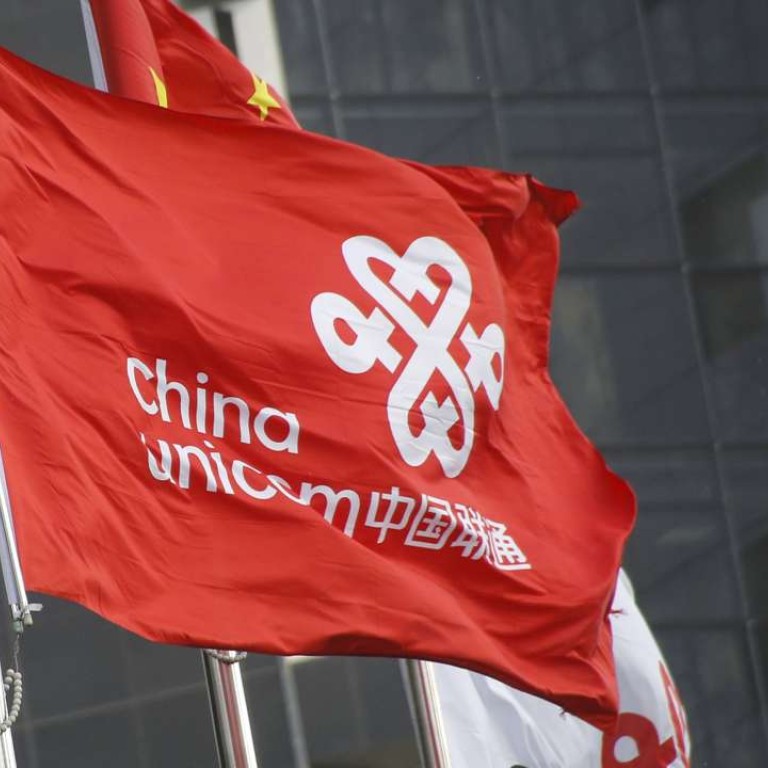
Fourth China telecoms operator not seen as threat to ‘Big Three’
CBN has applied for a basic licence, including telecommunications infrastructure and domestic internet data transmission services
When news broke last Wednesday that the Ministry of Industry and Information Technology (MIIT) was considering granting a basic telecommunications services license to the state-owned China Broadcasting Network (CBN), the Hong Kong-listed shares of the mainland’s “Big Three” operators were rocked as the prospects of a fourth domestic telecommunications market player apparently spooked investors.
Industry leader China Mobile, the world’s largest wireless network operator by subscribers, saw its shares slide to HK$88.75 that day, down from HK$89.40 on Tuesday. The stock finished up on Friday at HK$91.30.
China Unicom tumbled to HK$9.44 from Tuesday’s HK$9.74. It closed at HK$9.43 on Friday.
Shares of China Telecom, the mainland’s largest fixed-line network operator, were down to HK$4.04 from HK$4.17 on Tuesday. It fell to HK$3.93 at the end of the trading week.
We do not think [CBN] will become a meaningful threat to the Chinese telecommunications network operators in the next few years
According to mainland media reports, the MIIT confirmed on Thursday via its Weibo account that the CBN applied for the basic licence that included telecommunications infrastructure and domestic internet data transmission services.
Analysts, however, assuaged investor concerns of more intense competition in the industry, especially its impact on Unicom and China Telecom.
“We do not think [CBN] will become a meaningful threat to the Chinese telecommunications network operators in the next few years,” Nomura research analyst Huang Leping said in a report.
With detailed plans still unclear, Huang said limitations in the supply of smartphones and CBN’s own capital constraints point to the company initially offering Wi-fi hotspot services in selected cities across the mainland.
Bernstein senior analyst Chris Lane pointed out that CBN had some national networking backbone in place, but it “does not own any last-mile access” in terms of fibre-optic infrastructure directly linked to commercial buildings and residential areas.
CBN was established in 2014 by the old State Administration of Radio, Film and Television – the media and broadcast regulator now known as the State Administration of Press, Publication, Radio, Film and Television – with a mission to consolidate the country’s cable TV industry into one network.
That followed the so-called “TriNet convergence” directive made in 2010 by the State Council, which gave the green light to pilot programmes for cable TV service providers to merge, upgrade their infrastructure and compete with the telecommunications network operators in the fixed-line broadband market.
Last year, the State Council issued a directive for national deployment of TriNet convergence. This opened the way for domestic telecommunications network operators and television broadcast service providers to directly compete in each other’s turf.
Bernstein’s Lane said merging the cable companies has proven difficult since their industry is highly fragmented and that CBN was poorly capitalised.
Many mainland cable TV firms are owned by local governments which harbour independent ambitions of national expansion, while others are often a small cog in large media-based conglomerates, he said.
Nomura’s Huang said CBN was “was not even close to finishing the consolidation of the cable TV industry in China”.
“We remain sceptical on the scale of the network that CBN can deploy in the long term,” Huang said. “We expect CBN to spend 20 billion yuan [HK$23.8 billion] in telecommunications capital expenditure this year, which is equivalent to 5 per cent of China’s [overall] telecommunications industry spending.”
At the end of last year, domestic cable operators only had 18 million fixed-line broadband subscribers, or 8.6 per cent of the total market, according to government data.

